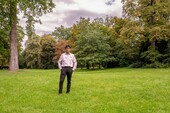
Group Leader: Research Group Sylvanus, Institute for Technology Assessment and Systems Analysis (ITAS), Karlsruhe Institute of Technology (KIT)
"KIT-Associate-Fellow" [eligible to be a Ph.D. Supervisor and Examiner (Prüfungsberechtigung)] at the Faculty of Civil Engineering, Geo and Environmental Sciences, Karlsruhe Institute of Technology
Emails: somidh.saha@kit.edu; somidhs@gmail.com
"KIT-Associate-Fellow" [eligible to be a Ph.D. Supervisor and Examiner (Prüfungsberechtigung)] at the Faculty of Civil Engineering, Geo and Environmental Sciences, Karlsruhe Institute of Technology
Emails: somidh.saha@kit.edu; somidhs@gmail.com
|
Grants
Research outreach
|
About my research
I love nature, plants and wildlife. I try to understand their responses to environmental and anthropogenic factors in many different ways. I always wonder how we perceive the benefits we receive from plants and animals in natural and urban forest ecosystems. Often we take those benefits for granted and only understand their actual values after we lose them from ecosystems. So, I love quantifying those benefits as precisely as possible and the underlying processes behind those benefits. Most of the time, we term those benefits from forests as ecosystem "services" (service is a very anthropocentric view anyway, correct?), and we often forget when those "services" for us become "sacrifices" of forest ecosystems. Therefore, I see myself as more a "carer" than a "manager". Globally, urban, peri-urban, natural, and semi-natural forests are declining due to urbanization, mutiple anthropogenic impacts, diseases, and climate change-induced disturbances. Broadly, my research aims to restore forests after disturbances and make future forests more resilient to climate change impacts. Therefore, I try to understand how change forest structure and composition, from urban to rural/natural gradient, are related to ecological and biophysical processes and how those relations influence supply, synergy, and trade-offs between different types of benefits we get from forests. Understanding the change in ecological and biophysical processes by climate change or urbanization interests me a lot. I am interested to study how findings can be implemented in practice to transform our forests to increase our forests' social-ecological resilience. Therefore, I involved stakeholders from all interest groups while designing and creating future forests to ensure environmental and social justice for all. In my opinion, sustainable solutions for challenges in forest management can only be realized in a democratic and free society if we invite and involve stakeholders and multiple sectors from the beginning of the research project. As a result, some of my research works are interdisciplinary and transdisciplinary. As of April 2023, I have study sites in Germany, India, China, Ghana, Indonesia, the USA, and South Korea. About me My first name in the Sanskrit language ("Somidh" in Latin script, "समिध " in Devanagari, and "সমিধ " in Bengali script) means sacred wood of species such as Aegle marmelos, Santalum album, Ficus spp., which are burned during Yajñá or religious fire ceremony to worship Hindu God of Fire Agni. I was born in the village of Bhowraguri, Kokrajhar district, Assam, India, which is situated near the Eastern Himalayas. I spent until the age of 10 at the village Lhamoyzingkha of Bhutan (Kalikhola in Nepali), at the lush green Himalayan valley of the river Sankosh. My first schooling was at the Lhamoyzingkha Central School, also known as Kalikhola Junior High School. My childhood in Bhutan, immersed in the beautiful forests of the majestic Himalayas, influenced my later education and career. My family moved to Bhadreswar, Hooghly district of West Bengal, India, in 1991. I studied from class five to twelve in the neighboring city of Chandernagore at the higher secondary school Kanailal Vidyamandir, which the French Colonial Administration established as Ecole de Sainte Marie/Dupleix College in 1862. I graduated with B.Sc. Honours in Zoology from the Presidency College, University of Calcutta, in 2003. An excursion to the Jim Corbett National Park in north India as a B.Sc. student ignited the jungle lore of my childhood, hence, motivated me to study Forestry. I completed an M.Sc. degree in Forestry from the Forest Research Institute, Dehra Dun, India, in 2005. The German Forester Sir Dietrich Brandis established the Forest Research Institute of India ("father of tropical silviculture") in 1878 as the first western forestry training school outside Europe. My interest in German forestry and sustainability research grew when I was a student at the Forest Research Institute of India. I worked as a Forester in the Eastern Indian state of Odisha from 2005 to 2008 at Ballarpur Industries Limited, then India's largest pulp and paper company. I moved to Germany in 2008 with a scholarship from the German Academic Exchange Service (DAAD - Deutscher Akademischer Austauschdienst) to do a Ph.D. (Dr. rer. nat.) in Forestry at the Albert Ludwigs University of Freiburg under the supervision of Prof. Dr. Jürgen Bauhus. I did my Postdoctoral Research in Freiburg and worked there until 2016. I joined the Karlsruhe Institute of Technology (KIT) on 1st January 2017 as a Scientist. Since November 2021, I have been working in KIT as a "research group leader/senior scientist" in a permanently employed position. Cooking, reading, and hiking are my hobbies. I am married, and my son was born in Karlsruhe in 2019. |
